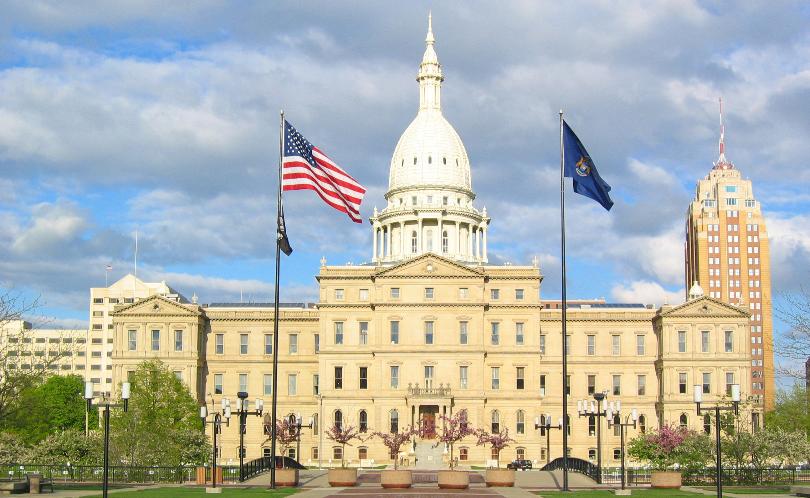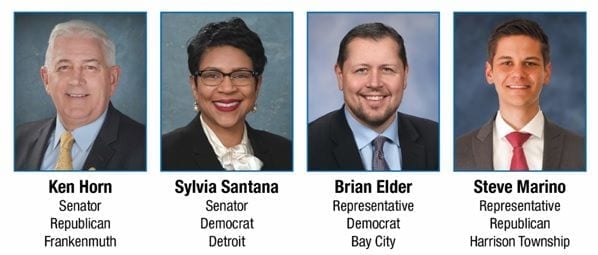
CAM Legislative Breakfast 2020
By Dennis Burck
The CAM Legislative Breakfast has been providing an annual review of Michigan’s legislative priorities and their impact on the construction industry for five consecutive years. While the 2020 gathering had to be done virtually, it was still a much-needed insight into what we may expect from our government in the coming months. Special thanks to all of our sponsors and participants.
Featured Panelists

As government and industry cope with the gravity of Coronavirus’s economic upheaval, the construction industry is not immune from falling in its orbit. Projects were delayed, budgets were stretched thin and economic stimulus was exhausted.
“2020 has certainly been a challenging year for all of us,” CAM President Kevin Koehler said. “The global pandemic, our workforce shutdowns here in the construction industry, the lockdowns on our families and friends, the presidential election, the friction we are experiencing between our governor and the White House and frankly, our ongoing budgeting issues — they have all taken a toll on our industry and on all of us.”
“Through it all, CAM has worked hard to get us back to work, keep our men and women safe, and to keep our members informed about everything that is going on,” Koehler said.
For its 5th annual Legislative Breakfast, moderated in a virtual format on Tuesday, October 20, 2020, CAM welcomed Rep. Steve Marino (R) of Harrison Township, Rep. Brian Elder (D) of Bay City, Sen. Ken Horn (R) of Frankenmuth and Sen. Sylvia Santana (D) of Detroit to the panel. The group weighed in on construction legislation, the budget deficit and the political forecast for 2021. Despite the challenges, there is bipartisan support and optimism that the construction industry is one of the most prepared industries to weather the present and future.
The virtual Legislative Breakfast was generously sponsored by Conci Painting Inc., JJ Barney Construction Inc., Ruby + Associates Inc., Superior Materials LLC, Bricklayers and Allied Craftworkers Local 2, Operating Engineers Local 324, CAMComp Workers’ Compensation Plan, National Electrical Contractors Association (Southeastern Michigan Chapter), Michigan Regional Council of Carpenters, BeneSys Inc., Watkins, Pawlick, Calati & Prifti PC, Plante Moran, and MCA Detroit.
CAM Lobbyist Jason Wadaga, Vice President of Governmental Relations for Kindsvatter Dalling & Associates (KDA), moderated the discussion.
Legislation in Action
Opening up the dialogue, Wadaga inquired what each politician is working on at the moment.
Santana said she is trying to pass legislation to keep low-level offenders in the workforce and out of jail. “I think these efforts really impact our economic stability here in Michigan,” Santana said. “We have a lot of returning citizens leaving the jail in Ionia who have experience in trade skills. I think those individuals would definitely benefit from an opportunity to work in construction and support our infrastructure in the state of Michigan.”
Across the “aisle,” Horn said he has been focused on getting the manufacturing and construction industries back on track after the economic fallout from COVID-19. “Our roots are construction and manufacturing. The people that build things are the people that make Michigan work,” he said.
One of his focuses is increasing developer access to the Brownfield Transformational Act funding. “It is for big significant projects that could literally change the skyline of the community. With that legislation, you see [Dan] Gilbert’s tower going up on the old JL Hudson’s site,” Horn said. “We want to make sure our departments are propagating the rules properly so developers can take advantage of that programming with big developments.”
Marino explained that his prime focus is on facilitating economic recovery from the COVID-19 pandemic. “Construction and manufacturing will be the number one economic driver to bring us out of this as it always has in Michigan. We as the government need to be smart about what we’re doing, stay out of your way and equip you guys for the goals that you need.”
Elder said he is looking forward to more bipartisan legislation being passed. As a member of the House Judiciary Committee, Elder was part of the team that worked on the recently passed COVID-19 Business Liability Package. The bill extends protections to businesses from COVID-19 lawsuits and enables them to extend unemployment assistance to employees.
“The COVID-19 crisis effectively put a pause button on our term. The economy took first priority, so there is a significant amount of work we can do in the lame-duck period with good bills with bipartisan support that is queued up and ready to go through hearings. We have a lot of work to do that’s been bottled up due to the COVID-19 crisis.” One piece of legislation that was held up is the Michigan Construction Payment Act, colloquially known as “Prompt Pay.”
Bipartisan Support for “Prompt Pay”
Elder is the sponsor for HB-5375 or the Michigan Construction Payment Act. The bill was introduced in January 2020. “It is a reasonable bill. It simply says that if contractors complete their work, they have to be paid within 30 days,” Elder said. “That is true of many construction projects but not all. It is a best practice that should be extended to everyone in the industry.”
Elder said he hopes to work through it in the lame-duck session.
Marino is a co-sponsor of the bill. He said that a hearing is likely in the lame-duck session, however, everything is pending the COVID-19 crisis. “We do have to do work outside of the COVID-19 pandemic,” he added. “I do look forward to the discussion.”
Both senators were supportive of the bill as well. “We have a good understanding of the bill itself,” Horn said. “It is now just a matter of grinding it out and getting her done legislatively, but I am supportive of the idea in concept.”
Santana said she would like to see the bill extended to not only the private sector but to municipalities and counties as well. “As we’ve seen in the city of Detroit, we’ve had several minority contractor businesses pretty much dismantled because of payee circumstances,” Santana said. “I think it will help a lot of our subcontractors as well as the larger providers of work to let them know there is a deadline to be paid within the service of their work.”
Budgeting for 2021
Wadaga said that initial reports might have seen the state stuck with a $3 billion deficit in 2020, but the actual number is just under $1 billion. Wadaga asked each member of the Michigan Congress to weigh in on the budget moving forward.
“One of the markers we need to lay out is how open is our economy?” Horn said. “Our public schools and local governments are dependent on tax revenue. What is consumer confidence out there? Much of that is driven through retail sales and the travel industry in Michigan.”
Both manufacturing and construction industries are trying to catch up on past work with margins stretched thin, Horn added. “What is happening is they’re filling out contracts but they’re doing them with 190- or 120-day grace periods, and those grace periods came to an end in August. Their cash flows are really hurting.”
However, Horn remains optimistic about the national economic recovery. “I hope out of this we learn that manufacturing is indeed a national security issue in terms of our medicine and car parts. We need to make things in the USA.”
Santana said there were already foreseen constraints going into the 2022-2023 budget years, but the pandemic has complicated things further. “I am cautiously optimistic about where we stand in the state moving forward with the budget. Lucky for us, we did come up with the legislation that would allow us to collect sales tax for online purchases. This ultimately was a benefit so we could sustain our sales tax revenue.” A group of bills was signed into Michigan law in December 2019 to allow the state to collect online sales tax far before the online shopping boom during the pandemic.
Santana said the future is tied to how we continually navigate the COVID-19 crisis. “With COVID not having an end in sight, we do have to project for future budgets to make sure we can sustain ourselves. There is a lot to be concerned with, but I am hoping there will be an end in sight with COVID so our economy can get back to full force.”
Marino said that federal help carried the day. “Ultimately, it was the CARES Act that helped address the fiscal year and the vast majority of the shortfall we were looking at.”
Election Outlook
With members of the House campaigning for another term in Michigan against the backdrop of the presidential election, Wadaga asked each member of Congress how they are hedging their bets in this election cycle.
“The presidential election is really driving voter enthusiasm on both sides and that will have an impact on what happens,” Elder said. “The [Michigan] House is a jump ball. I think it will be incredibly close. I don’t think we will know that on November 3.” Elder said that he expects Biden will carry the state of Michigan given more accurate polling data than 2016.
“Macomb County is crazy. I don’t know if anything is mainstream in Macomb County,” Marino said. “I would love to say no matter what it will be over after 11/3. I am really looking forward to the election being over and getting back to work.”
Horn chimed in: “I think the biggest loser nationally will be the mainstream media and social media for how they handled the recent issues.” Regarding the race in Michigan, Horn said it is not much different than 2016. “In my area, we are a little bit like Macomb. We have Saginaw and in the southern part and west wall where I represent there is a lot of labor, and they voted for Trump in 2016. But I think Biden brings a different perspective to that vote.” The House will still likely remain Republican, Horn added. “It will be close, but we will still maintain authority.”
Sen. Santana said she sees a different voting climate in southeastern Michigan than in 2016. “I think people are tired of the last few years. Regardless of the outcome of the election, at the end of the day, we have to make sure we come together as a country. It’s been too partisan,” Santana said. “COVID has really changed the game for all of us. I think ultimately it is about stability here in Michigan, job opportunities are available and we are doing whatever we can to rebuild our infrastructure and economy.”
Panel Moderator

Jason Wadaga
Vice President Governmental Affairs
Kindsvatter Dalling & Associates
Jason serves as KDA’s lead lobbyist. He can typically be found in legislative meetings, committee hearings and at legislative session representing KDA’s lobby clients. He also serves as the Executive Director for three of KDA’s association management clients, including the Construction Association of Michigan.
His career includes extensive experience in politics and the legislature. He started his political career as a Sophomore at Northern Michigan University working on a variety of campaigns which brought him to Lansing. He spent nine years in the Michigan Legislature working in a variety of roles including serving as the Chief-of-Staff to State Senator Rick Jones before joining KDA. Born and raised in Michigan’s Upper Peninsula, Jason lives in East Lansing with his wife Kimberly and sons Nolan and Reid.
Recent Posts
-
CAM NewsBriefs – February 16, 2026
eNews
-
Recap: 2026 Great Lakes Design and Construction EXPO
CAM News
-
CAM Magazine's February 2026 Issue Is Ready to View
CAM Magazine
-
One Industry, One Resource: Why CAM Membership is the Ultimate Investment for Michigan Contractors
Member Benefit
-
CAM Introduces 2026 Board Members
CAM News
-
CAM Announces the 2025 Project of the Year
CAM News
